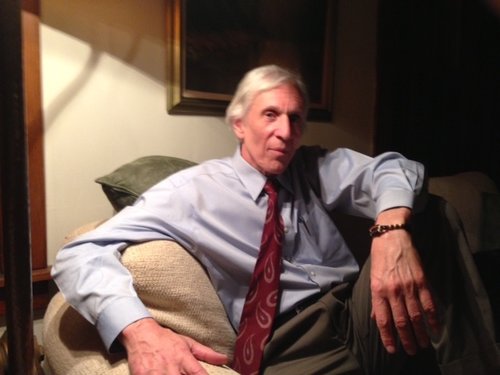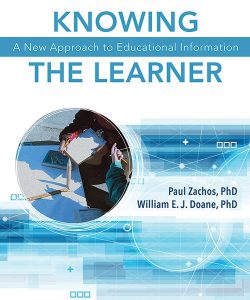http://www.smartacus.com/smartacus-the-blog/challenging-the-tyranny-of-conventional-testing-and-grading
Challenging the Tyranny of Conventional Testing and Grading
October 17, 2017

PAUL ZACHOS has been developing for nearly 30 years an approach to assessment and evaluation that could revolutionize education and training programs. In Knowing the learner, Zachos and long-time colleague William Doane have published the most comprehensive exposition on this approach yet.
In their new book, Knowing the Learner: A New Approach to Educational Information, Paul Zachos and William Doane challenge conventional approaches to testing and grading, arguing that it’s time to separate assessment from grading and give students and teachers educationally useful information about student progress.
Zachos and Doane will discuss this new approach in a free public lecture Sunday, October 22, at 5 p.m. at Northshire Bookstore, 424 Broadway in Saratoga Springs.
Director of the Association for the Cooperative Advancement of Science and Education since 1991, Zachos has worked in education for more than 35 years, including 14 as an elementary, junior high, and high school teacher, and 12 as a researcher and planner for the New York State Education Department. For most of that time, he and Doane, whom he met in the 1990s during a joint research project on scientific creativity, have been developing an approach to assessment and evaluation that could revolutionize education and training programs by directing the focus to essential learning goals and ways to support their attainment.
In Knowing the Learner (Shires Press, 2017), Zachos and Doane have published the most comprehensive exposition on this approach yet. Knowing the Learner offers a new perspective that challenges unproductive testing and grading traditions in educational institutions. Zachos and Doane show that, when carefully designed, assessments can be made not just informative, but even inspiring and fun. Their new approach is designed to work at every level of education and for any subject matter.
Example I:
Jason Brechko, Glens Falls Middle School:
Being Straight With Students
Conventional tests — which Zachos and Doane call “high-stakes, norm-referenced” tests, such as the SATs — do not provide the information needed to effectively support teaching and learning. Invariably, their application in educational environments becomes social coercion. It was at Zachos’s urging that Glens Falls middle school science teacher Jason Brechko, after years of resisting, finally decided to try collecting and applying information for strictly educational purposes.
Anyone who has spent time as a teacher at the secondary level knows that middle school kids typically are most challenging. Puberty kicks in during those grades, sending hormone levels soaring. That’s also when schools start to let up on the adult supervision and kids are asked to transition into a more autonomous environment.
“They’re quirky,” says Brechko, who taught for 13 years at Glens Falls High School before downshifting to the middle school. Managing a class of seventh graders, he quickly discovered, turned out to be much tougher than managing sophomores, juniors and seniors.
“It was terrible,” he says. “A student would behave badly or fail to follow an instruction and I would just get angry. I was acting like an idiot, and they were acting like idiots. I knew there had to be a better way.”
The approach Brechko came up with was simple, but almost magical in the way it worked. He decided to just be straight with his students and tell them he would evaluate them on their demonstration of four basic accomplishments that support the attainment of state standards:
- listening without interrupting
- working independently
- finishing work on time
- demonstrating respect for visitors to the classroom, especially substitute teachers
Instead of blowing up at students who behaved badly, Brechko found he could dispassionately pull out the chart he maintained for each student, and make a record of the incident. Periodically, he could just sit down with the student and review the numbers, pointing out good progress being made in one area but not so much in another.
“It transformed my classroom,” he says.
Example II:
John Delano, University at Albany:
Focus on Accomplishments. Give ‘Zero Stakes’ Feedback.
University at Albany professor John Delano, who collaborated with Zachos and Doane in writing Knowing the Learner, clearly proved the efficacy of this new approach to assessment in the introductory chemistry course he taught until recently retiring. Two or three times per lecture, Delano would display multiple choice questions on key concepts on a screen and ask his 500 students to show their answer by holding up a color-coded sheet that showed their answer as A, B, C, or D. They were free to discuss it with other students around them and consult their texts.
When Delano announced the correct answer, cheers would erupt from all who nailed it. Through this simple “zero-stakes” approach, Delano says he was able to keep students engaged, motivated, and consistently informed on the progress they were making toward mastering key concepts.
“It made my teaching more economical and efficient,” he says. “If I saw a sea of red reflecting the right answer, I knew I could speed up,” he says. “If I saw a spectrum of four colors, I knew I had to slow down.”
“To teachers who say, ‘I don’t have time to assess my students’ progress, I say, ‘That’s wrong. You don’t have time not to assess.”
In Sum
The critical change that must occur is to effectively separate grading from assessment. If we focus on accomplishments, we can motivate students to become engaged in learning and put forth their best efforts irrespective of their levels of achievement and previous successes or failures. It’s entirely non-threatening and educationally informative. and it’s supportive of instruction.
The entire landscape of the educational environment changes when teachers adopt accomplishment-based grading. Cooperation and collaboration in the teaching and learning process become practical. Openness becomes the classroom’s hallmark.
Grading schemes built around worthy accomplishments can be made powerful motivators for achievement and learning. Our habits and beliefs about the best ways to do things need to be examined in the light of experience and evidence. It’s time for teachers themselves to take a more central role in such systematic investigations.
To learn more and join Zachos and Doane in a provocative conversation, join us this Sunday at 5 p.m. at the Northshire Bookstore. [This event was held in 2017]


